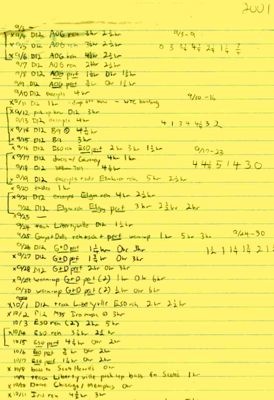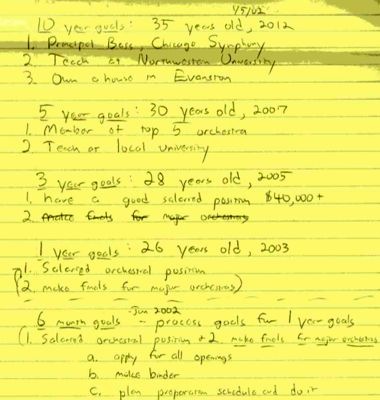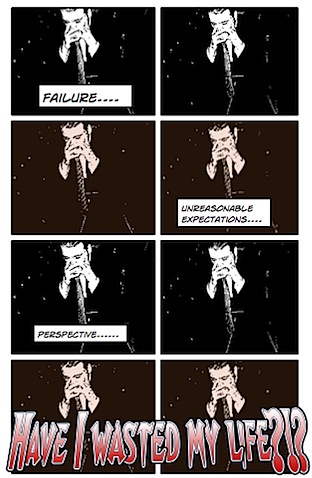The title for this post is flagrantly ripped off from Doug Yeo, bass trombonist for the Boston Symphony and the author of yeodoug.com, a fabulous internet resource for all classical musicians and students. Doug wrote a great article with this exact title that I remember reading 10 years ago, and it really shaped my thinking while I was in school. This is my own personal variant on the the themes in Doug’s article, and I think of it as an homage to him.
How did I end up here?
While doing a massive filing cabinet purge recently, I stumbled upon some goal sheets that I had written out for myself shortly after finishing graduate school. Though I hadn’t landed a playing job, I knew that it was only a matter of time. I’m JASON HEATH, after all. Surely “my job” is out there just waiting for me to auditon for it. The world was truly my oyster.
I was always a firm believer in the power of committing things to paper. The act of writing things down organizes your thoughts, clarifies your mind, and make it more likely that you will achieve your dreams.
I kept meticulous practice records, recording everything I worked on in my own Byzantine code:

I didn’t leave it at that, however. Setting goals–clear, tangible goals–made me much more likely to achieve them. Right?
I committed my long and short term goals to paper. Looking back on them now, I can’t help but wince:

Guess how many of these goals I achieved? None. Sure is a good feeling having a 100% failure rate for my goals…
We have no control
In hindsight, these goals were unreasonable because they hinged entirely upon outside forces. How could I become principal bass of the Chicago Symphony? This wasn’t even an option…
For many, these goal setting exercises are valuable because they keep you inspired and reaching for the stars. Even if you don’t achieve x, y, or z, you will be closer to your dreams for having undertaken the exercise.
For me, however, the complete failure to even make any demonstrable progress toward these goals highlights everything I hate about this “career path” I’ve been. No matter how hard I tried, how many hours I practiced, how much expensive gear I bought, how many lessons I took, how many people I played for, how many auditons I took, how much I meditated, exercised, or did yoga, how much I taped myself, how many goals I wrote out, or how much blood, sweat, and tears I let loose, the result was always the same:
Bupkus.
I poured my heart and soul into the audition process, spending countless thousands of dollars and endless hours in pursuit of a lowly double bass position in some orchestra–somewhere, anywhere.
What a waste…..
My actual successes
I’m being intentionally melodramatic here to prove a point. Most people reading this realize that the prize is in the process, and that all those hours of preparation and all that dedication have in fact paid off for me in spades if I take a less narrow view of things.
Did I get an orchestra job? Nope. But who cares? I’m probably just as happy as if I did, and I make more money than if I’d won many of the jobs I auditoned for. Also, ironically, I’m probably better known because of this freakin’ blog than if I had won an orchestra job. How you like them apples?
What’s really important in life? Family, friends, and the like? Of course. For me, it’s also about simply making some kind of difference with my work. Would an orchestra job have done that? Sure. But my blogging, teaching, podcasting, and performance activities do that as well.
Why am I really a musician? Do I feel fulfilled doing what I’m doing? Was music school a waste of my life? Are these soul-searching questions a waste of time?
Maybe it is a waste of time to think about this stuff–it is what it is, and that’s that. But digging up starry-eyed goal sheets from the past can’t help but make me think about this stuff!
Bass News Right To Your Inbox!
Subscribe to get our weekly newsletter covering the double bass world.

Jason,
The moral of the story is that life never works out the way it is intended. There are many twists and turns and all we can do is be fluid and go with the flow. The path of the classical musician is probably one of the most narrow-minded career paths one can think of. Music Schools are very idealistic and rarely discuss the real options available to its students. You talk about this in your book.
A large percentage of the general population ends up doing a different career path than their college major. The modern world demands flexibility and being ready for anything. Bottom line, the ends don’t justify the means in the classical orchestra business. Who is to say you would even like the job you landed. The money wouldn’t justify the job. You could of won your 56th audition and made $30,000 a year before taxes.
Many studies have shown that only 4% of the population has any goals at all. That means that 96% of the population couldn’t even imagine having a goal sheet like yours. I think what was important is that you had goals and were going towards them. They never manifested, but so what. Many gold medal striving atheletes never win a medal, does it mean all their training was a waste?
As every decade passes in life we evolve and change as human beings. Life presents us with different adversities and challenges and who knows what will happen tomorrow. If we stay locked into the idealistic goals of our youths, we will end up miserable musicians. We have all seen musicians get fired and quit orchestras because it hasn’t satisfied their youthful craze for greatness.
In summation, the final job one ends up doing doesn’t define what level of musician you are. Some of my favorite bass players don’t have major jobs at all. I say as life changes, our goals change as well. Thanks for bringing these ideas to life. They are important issues to discuss.
All the best,
John Grillo
http://www.classicalmusicnews.tv
i am a junior in high school, considering a career as a bassist.
if YOU cant get an orchestra job, how will i be able to?
Person, the article was definitely not written to discourage people from entering the field of music. I think it’s logical that all of us should be realistic; it’s a very competitive and cut-throat world, especially in the music business. The most important phrase that I got out of this article is “the prize is in the process.” After all, life is a process, and it’s the experiences you achieve along the way that builds who you are as a musician and as a fulfilled human being. There are countless symphony musicians, even in major orchestras who are incredibly bored, unhappy and unfulfilled. Just be realistic that the music business is very competitive and that you CAN succeed as a bass player even if you aren’t Principal of the Berlin Philharmonic…Oh…And also, at least we don’t play Tuba…how many Tuba jobs are currently available? Talk about depressing.
I’d like to elaborate on John Grillo’s two comments about “goals” and “youthful craze for greatness.” The 96% without goals end up doing something they don’t like and serve out their life sentence doing it with a few interspersed prosaic binges. Living without goals allows the weak-hearted to carry out their life completely oblivious about what greatness actually is. It’s a proactive coping mechanism that is used when one is fearful of the future. That’s how society has ended up with people who think they are good enough to join The Three Tenors after scoring the lead role in the community theater production of “Pippin” or Godspell.” Why have real goals when you can define “greatness” at a convenient attainable level when the opportunity presents itself? I would rather be an enlighted failure than a clueless achiever. Rock on, Jason.
Dear Jason.
Yes thats right, life never works out how you thought.
I am also was thinking of getting a principal position, of course.
But like it happens many times, there are a lot of possibilities in life.
Now I am teaching double bass, music history and chamber music at a little conservatory in a little village in south-west Spain.
Spain!!! Never even thought about Spain. Munich, Berlin, London, Paris, NY, yes sure, who am I???
I am happy now???
Yes of course, I live in Spain, because my wife is spanish and we have a 1 month old son called Gabriel, who is just the greatest thing in life what can happen to you!!!!
Since I came to Spain I changed. I opened up my mind and my view to the world of bass playing and dropped off my narrow view of making music and bass playing when I was a student. For this I am very thankful.
I like teaching! I didn`t know that before. I like to try to open a new world for the kids they didn`t know before.
And I even love music and bass playing more than before. Now is when you start to find your own voice, when nobody can say anymore, “we don`t play this like this…”, OK, but I do… .
Making plans is good, having dreams is even better, but with the plans you should know its better to have them in mind, but you should be open and fexible. Maybe there is something coming along your way, which is even better than the plans you have made.
Un abrazo, Michael.